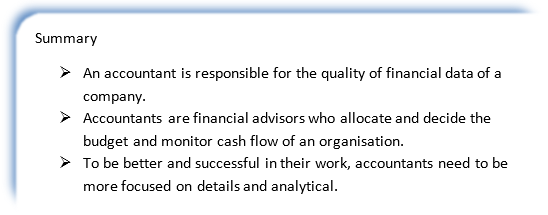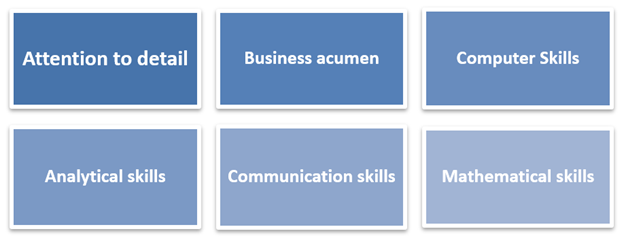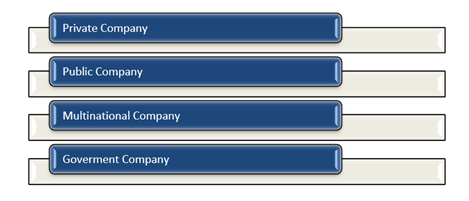Accountant
Updated on 2023-08-29T11:54:09.870902Z
Who is an Accountant?
Accountant refers to a person or professional who is responsible for keeping or evaluating the records of funds received, paid, and possessed by a company or a person by preparing and interpreting the financial records of people or a company.
What are the primary areas of work for an accountant ?
Accountants are financial professionals who work on auditing, tax return filing, financial statements, account analysis, and the management of the accounts of a company—either private or public. Every organisation needs accountants – be it a corporation or individual, small or large, profit or non-profit. Also, accountants can set up their own private practice and work with an entity who enlists their services.

Accountants perform various financial duties that vary based on the organisation they work for. Accountants conduct account analysis, check financial statements like balance sheet or profit & loss statements, financial documents, and other financial reports to verify their accuracy. They perform annual audits, keep a check on financial operations, prepare and fill tax returns, give suggestions on areas that need more productivity and cost-savings, and do risk analysis and even forecasting.
Accountants can work with any large organisation with an internal finance department, or they can set up an own practice such as the CPA, CAs.
What are the most vital roles and responsibilities of an accountant?
The major role of an accountant in a firm is to make sure the quality of financial reports. The main motive of an accountant in business is to protect the quality of financial reporting. Accountants in any organisation are responsible for the accuracy of financial reports, from where the numbers and figures are put together.
- Financial Advisor: An accountant acts as a financial advisor of a company by providing valuable suggestion in money-related decisions, such as purchasing new machinery, investing in a portfolio, reducing the expenses, and so on.
- Ascertaining the Accuracy: An accountant guarantees the accuracy of financial data, documents, and their records, under the auspices of related laws and regulations. An accountant makes sure the accuracy of financial records because it may affect the company. Every investment decision lies on the accuracy of financial records of a company.
- Preparing & Maintaining Financial reports: An accountant is responsible for preparing and maintaining the financial reports accurately. He maintains the financial reports monthly, quarterly, and yearly. Organised records of financial data help management and investors to make their decisions.
- Budgeting & Monitoring: An accountant sets a budget for everything in a company and also monitors expenditure on all the activities like buying machinery, monthly expenses, rent, electricity, and fuel, etc. Accountant helps in deciding the budget for various events and activities by keeping in mind how to spend, when to spend, and why to spend? The accountant keeps an eye on all transactions of the company.
- Evaluating financial operations: One of the most important tasks of an accountant is estimating the financial operations to suggest the best, determine problems, find out solutions, and help a company run smoothly.
- Helps in cost reduction: An accountant always tries to reduce the cost of a company by keeping an eye on cash flow of the organisation, and all those activities involving money. An accountant also gives suggestions by analysing the past financial reports of the company in consideration.
- Helps in profit maximisation: An Accountant helps in enhancement of revenue and maximising profit by offering guidance on cost reduction, and various financial decisions.
What skills are required to be an accountant?
Attention to detail: An accountant must have strong observation to detail to maintain and keep information’s quality and accuracy. Mistakes might happen when there is the handling of huge amount of financial data, but tiny errors can result in bigger problems if they are not caught on an interim basis.

Image Copyright © 2021 Kalkine Media Pty Ltd
Business acumen: An accountant needs to understand the basic things of a business to perform, like accurately interpreting and analysing accounting data. He needs to be well versed with all the business-related terminologies, concepts, and theories, in order to come out with upbeat effects for a company.
Computer skills: In this era, an accountant should know how to use accounting software and other computer accounting-based tools to work in an effective way. Accounting software tools include Tally ERP9, Busy accounting, etc.
Analytical skills: Analytical skill is the most important skill in order to analyse and gather financial data. It is an important feature to recognise patterns and possible issues. An accountant must be an expert in analytical skills.
Communication skills: Communication is the key to transparency and accuracy. Accountants have to be good communicators in order to accurately collect facts and figures from stakeholders, clients, or managers.
Mathematical skills: An accountant better be good with numbers. This does not imply that he needs to be an expert in complex mathematical skills. Mathematical skills are mandatory in the process of analysing, comparing, and interpreting facts and numbers.
What type of Companies need an accountant?
Companies whether large or small, corporate or government, profit or non-profit organisation, depend on an accountant. An accountant is an adviser, legal expert, and strategic consultants, who does complete assessment of financial data and does forecast with the help of past-year data to keep your business at a well, booming state. Make no mistake; an accountant ensures all financial information is clear, reachable, and organised.

Source: Copyright © 2021 Kalkine Media Pty Ltd
Accountants help in better financial data analysis, to forecast return, make aware of losses, and form strategies for the future. They are a crucial root of information and guide for making hypercritical business decisions on a regular basis. They directly help in the maximising the profit of a company by providing all the needful information at the time of an investment.
Whenever you fall in your business, they give a new way based on the overall view, advising on what to do, how to do, and when to do, offering solutions to problems or different business ideas. They help an individual in growing and expanding their business.